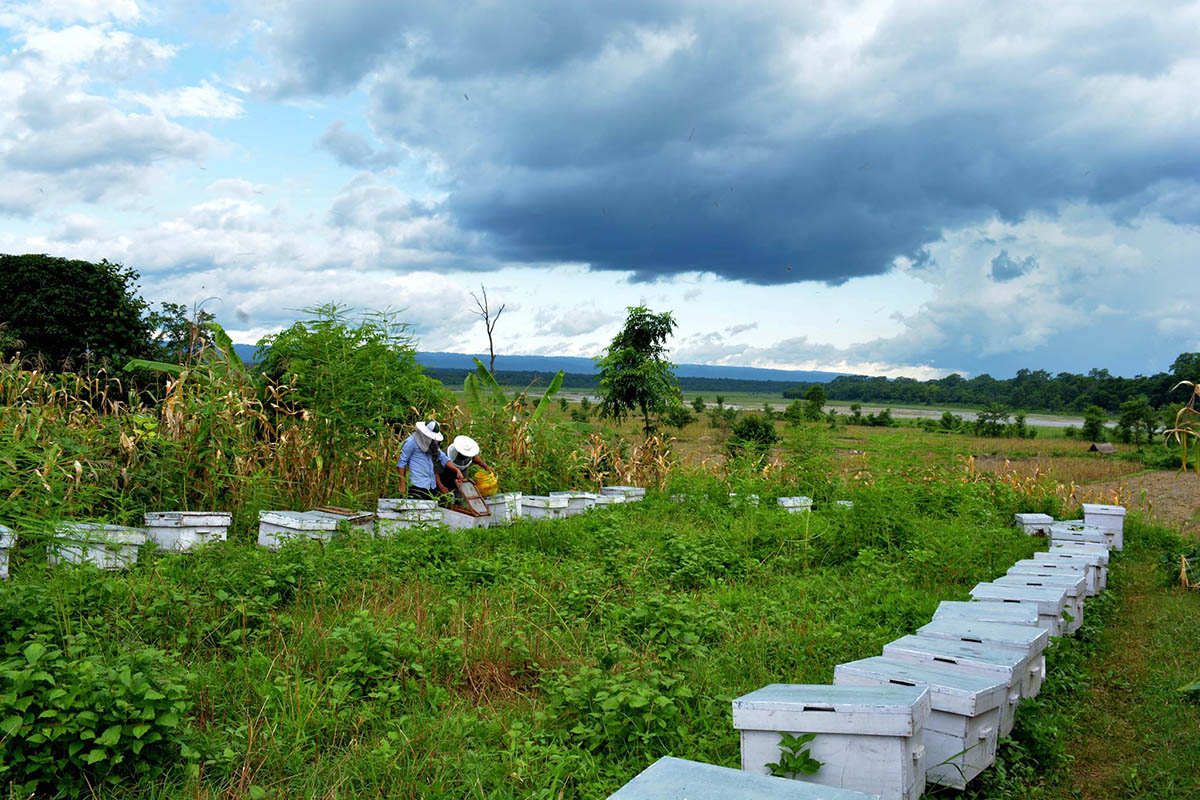
KATHMANDU: Beekeepers have been facing problems in finding a market for the honey they produce. According to Federation of Nepal Beekeepers, approximately 21 tonnes of honey remain unsold at present.
Last year, 69 tonnes of honey remained unsold. Market issues for the produced honey were resolved to some extent after beekeepers met with the Minister for Agriculture and Livestock Development, Ram Nath Adhikari, and complained about the lack of a market for their produce.
At that time, Dabur Nepal purchased some of the honey produced by farmers. However, beekeepers warn that a large surplus of honey may accumulate due to insufficient market demand.
Bee experts stated that the unsold honey is not due to a lack of demand but is attributable to a lack of consumer trust in Nepali honey.
Federation President Subash Chandra Ghimire reported that a honey fair was organised in Kathmandu with the aim of providing information about honey as well as marketing the product.
Bee expert Jagadish Bhakta Shrestha explained that honey produced from mustard crystallises quickly and that honey naturally crystallises at temperatures below 13–14°C. He added that heating honey causes it to lose some of its qualities, although it remains beneficial nutritionally.
Problem in marketing Nepali honey
Shiv Prasad Sharma Paudel, outgoing president of Nepal Beekeepers' Association, stated that although honey consumption offers many benefits, there is an issue with its marketability. He said that following a decline in sales, beekeepers in previous years came close to abandoning the trade. However, after pressurising the government, the marketing problem was resolved to some extent.
"We, as Nepali farmers, recommend buying the honey produced by us, as natural honey crystallises, while honey that does not crystallise might be spurious," he said. Bikash Nepal, operator of B and B Honey Firm in Kalika Municipality, Chitwan, who attended the fair, expressed the view that such events would aid the marketing of honey.
Rajendra Gautam, former president of Nepal Beekeepers' Association, stated that although the potential for honey consumption in Nepal is significant, the volume of honey required is not being produced. He complained that farmers are facing difficulties because their honey is not finding a market. "Nepali honey is good in quality, but we have not succeeded in conveying this to consumers; the misconception that honey is fake also hampers its marketing," he said. Gautam added that the government should assist in marketing domestically produced honey, further noting that although the international market for Nepali honey is favourable, it is exported only in very small quantities.
Sujan Amgai, head of Honey Development Centre in Bhandara, Chitwan, stated that honey worth over Rs 50 million is exported every year. He expressed his belief that this demonstrates the potential for exporting honey produced in Nepal to international markets, adding that if honey is produced to meet the standards set by various countries, exports could be increased.
Farmers complain of depleting forage for bees
According to practising beekeepers, problems exist not only in marketing honey but also in securing adequate forage for the bees. Farmers contended that issues such as having to pay fees for bee conservation and for securing forage, owing to the increasing use of pesticides, need to be addressed.
Beekeepers cannot sell their honey directly in the market; they are required to obtain food licence from the government. Moreover, not every farmer can afford to have a processing unit—a challenge that experts say contributes to the limited sale of Nepali honey.
Januka Thapa, president of Nepal Beekeeping Central Cooperative Association, explained these various issues and emphasised the need to organise beekeeping farmers to work on improving the marketing of honey.
At the ongoing Honey Festival in Bhrikutimandap, Kathmandu, there are 40 stalls offering honey, beehives, pollen, propolis, hats, brushes and other items related to beekeeping. Farmers from all seven provinces are participating in the fair, and a discussion on honey has also been organised.
Federation President Ghimire, also the coordinator of the Honey Fair, said the event would provide information on the technologies used in beekeeping, the different species of bees and other honey-related matters.
Federation-affiliated farmers have produced 226 tonnes of honey this year alone. In Nepal, there are reportedly 12,138 colonies of Serena bee and 6,500 colonies of Mellifera bee, raised by 711 and 270 farmers respectively, affiliated with the federation.
By RSS



-1769766216.jpeg)
-1769765242.jpg)
-1769754921.jpeg)
